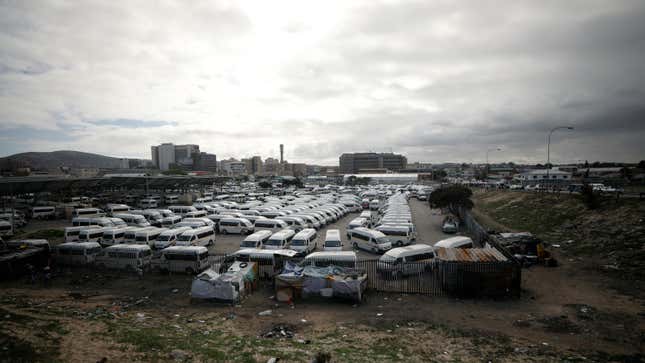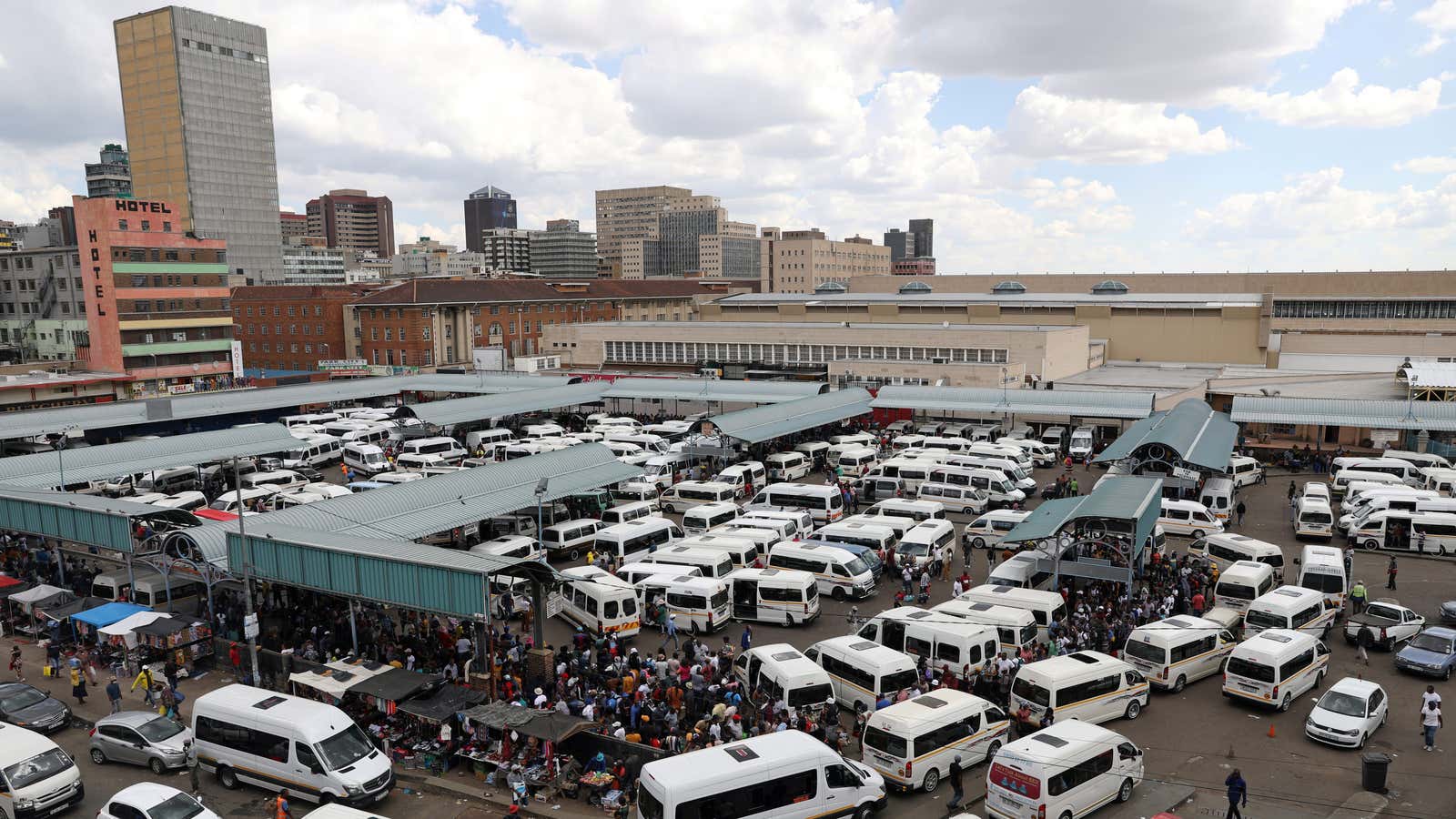Across South Africa, it’s a common sight to see dozens of people standing on the side of roads with their fingers up—“going downtown”—to hail minibus taxis. Some 250,000 taxis travel routes within and between South Africa’s cities and townships, across provinces and even across the border, accounting for the vast majority of work and education trips by public transport.
But when the country went into a strict, military-patrolled lockdown in March, the impact was visceral. The government restricted the number of hours a minibus taxi can ply, and capped the number of passengers they could carry. In an instant, the pandemic upended the economics of an industry based on cramming people in as tightly as possible. Even now, with South Africa’s lockdown dramatically eased, passengers per taxi have been capped at 70%.
“It’s been really, really bad,” said Themba Makhubu, a taxi owner who is only making a fraction of the R600 a day ($34) he usually earns from his drivers for trips running from Soweto township to the Johannesburg city center. “There was a point where you cannot, as an owner, use all your taxis. You are limited to a certain number so you have to choose who works and who doesn’t work.”
On Monday (June 22) taxi operators went on a one-day strike, including in Johannesburg, to protest insufficient government help during the coronavirus pandemic. The transport ministry is offering 5,000 rand ($289) per taxi, while owners want 20,000 rand ($1,100) to offset the costs of social distancing and protective equipment. Many see the offer as a marker of the industry’s status as both necessary and neglected, shaped by decades of apartheid policies.
“It began in the shadows and unfortunately it has never quite emerged from the shadows,” said Dr. Melissa Tandiwe Myambo, a researcher at the University of the Witwatersrand’s Center for Indian Studies in Africa.

For decades, the opaqueness surrounding the taxi industry has suited both taxi owners and government officials. South Africa is economically dependent on its minibus taxis, which straddle the formal and the informal sectors, ferrying workers to workplaces across South Africa’s still racially divided cities. Without oversight, owners have been able to exploit drivers and passengers. The government in turn cheaply outsources what should be a public service to a private industry, Myambo says.“If two-thirds of South African commuters are using taxis, why has the government allowed this to be run as a private service?”
Myambo dismisses the government line that criminality in the sector has hindered formalization. As with transit systems across the world, Covid-19 has “in a very bold and emphatic way” exposed the inequality of the South African commute, Myambo says.
The South African government has made formalization an inextricable part of any Covid-19 aid plan, saying that taxis must be registered as small businesses in order to benefit from any government relief grants, which will in turn be distributed by the South African Revenue Services. Owners have rejected this, and view the tax collector with suspicion. The South African National Taxi Council (Santaco) says the focus on regulation distracts from the daily survival of thousands of drivers, and impacts the informal industry of vendors who trade around taxi stops and mechanics who service the industry.
In an act of defiance, drivers in KwaZulu-Natal threatened to hike prices and load their vehicles to capacity, flouting lockdown rules. The protracted talks have become a zero-sum game—the struggling South African economy needs the taxi industry to ferry its labor force, and the taxi industry needs a bailout from the state. Neither side is budging, leaving millions of commuters stranded.
As coronavirus infections spike in South Africa’s winter season, it is the poor who are worst affected. The pandemic has further exposed the post-apartheid failure to heal South Africa’s racialised economic inequality, from healthcare to public transport, and how difficult it is to normalize the structures that grew out of this oppression.

The minibus taxi industry was born out of necessity during the apartheid-era. The Group Areas Act was passed in 1950, just two years after the National Party came to power with apartheid as its central governing policy. The act began with the aim of controlling property ownership of non-white South Africans. Areas were segregated by race, leading to harrowing forced removals and the bulldozing of interracial neighborhoods, particularly if they were close to city centers or other prime locations.
As a result, Black South Africans lived in cramped, poorly resourced townships like Soweto in Johannesburg or Gugulethu in Cape Town, often miles away from their places of work, which were mainly situated in white-only suburbs and urban centers. While some provision was made to transport the black labor force in and out of the township through bus and rail, little attention was paid to the needs of black commuters within their neighborhoods. In urban areas in particular, as townships grew, the already insufficient rail system could not ferry all commuters, and did not serve local routes or between townships. By the 1970s, black South Africans were squeezing into minibus taxis.

The set of laws under the Group Areas Act were expanded several times to include limitations on the entrepreneurship of black South Africans. For a growing taxi industry, that meant it was forced to function informally, without permits, and prone to harassment from police. Drives and owners banded together in 1981, forming the South African Black Taxi Association, and representing about 60,000 people, according to a 2020 study (pdf) by the Institute of Race Relations, a Johannesburg-based think-tank. The apartheid government’s response was to deny them subsidies, beginning a legacy the industry still suffers under.
“It’s a real failing of the government that after all this time they have never managed to regulate the industry or formalize the industry,” said Myambo, who is also editor of Reversing Inequality in Johannesburg. “There’s a huge amount of dysfunction.”
In spite of this struggle, the industry has become both a part of the country’s identity—in Cape Town, men known as gaatjies hang from the doors of taxis shouting out stops like singing conductors, while in Durban, taxis have their playful monikers spray-painted onto their rears or doors. Nissan and Toyota, the two largest manufacturers of the 16-seater minibus, have released models unique to the South African market, with body trimmings in the colors of the South African flag and local names: the Nissan NV 350 Impendulo and the Toyota Quantum Ses’fikile. Mercedes Benz offers the higher end Sprinter Inkanyezi model.
It’s also a lucrative business. Last year, SA Taxi, a financial services company aimed at lending to the taxi industry, reported that the industry was worth an estimated 50 billion rand (nearly $3 billion). Despite a slowing economy, SA Taxi reported a 22% growth (pdf) in earnings. Owned by Transaction Capital, SA Taxi took advantage of the post-apartheid boom in the taxi industry and has financed more than 30,000 vehicles. It also sells insurance and service and maintenance plans, amounting to $12.2 million in 2019. Thanks to the Covid-19 pandemic, however, the group expects its results to decline by 19% (pdf) for 2020.
While industry body Santaco, and financiers like SA Taxi present a veneer of formalization to the industry, day-to-day operations can be far more cut-throat. The taxi industry is run by so many rival associations in bitter feuds with one another over routes, it’s been characterized by deadly altercations that have claimed thousands of lives over the decades (pdf). Passengers have little recourse in case of accidents, and drivers are vulnerable to exploitation. Six-day work weeks are common, starting at 4am and ending at 8pm or later, and often only result in a weekly wage of between 1,200 rand (nearly $70) or as little as 500 rand ($29).

Without a union, nearly impossible in an informal sector, drivers are unable to negotiate better conditions, like registering for the country’s Unemployment Insurance Fund or the government’s Covid-19 workers’ grant. Passengers are at the mercy of intermittent price hikes, hostage to few viable commuting alternatives. Female passengers in particular have been vulnerable to sexual harassment.
Owners like Makhubu, the son of a taxi driver, have tried to instill a level of professionalism in the job. The 32-year-old turned to taxis when he lost his job as an IT security technician. His small fleet of three vehicles are labelled with a call-center number for customer complaints and he proudly recalls a story in which a driver was hauled to a local association and blacklisted for harassing a woman. His drivers are also allowed to use his vehicles to make extra money for themselves on Sundays. Makhubu, however, remains an exception rather than the rule.
After the end of apartheid, the South African government made some effort toward bringing the industry out of the shadows: from building multi-story ranks to stop illegal parking and taxis clogging traffic, to recognizing Santaco as a formal industry body. But shiny urban architecture and boardroom negotiations have failed to fundamentally change things. South Africa remains deeply reliant on a largely unregulated industry that has struggled to evolve beyond the roots of its oppressive past. The taxi industry may be opaque, but Covid-19 has made its dysfunction, and the government’s role in it, stunningly clear.
